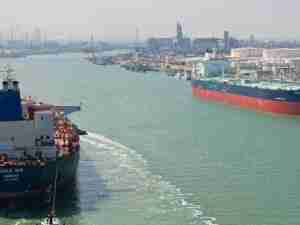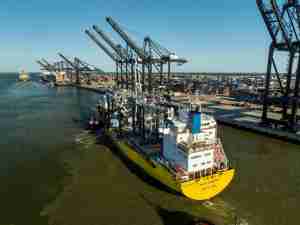The measure, “The SAFE Port Reauthorization Act of 2010,” extends anti-terrorism protections designed to safeguard the nation’s critical shipping lanes and seaports from attack and sabotage. Senators Collins and United Murray coauthored the original SAFE Port Act in 2005; it was enacted the following year.
“The scope of what we need to protect is broad,” said Senator Collins. “America has 361 seaports – each vital links in our nation’s transportation network. Our seaports move more than 95 percent of overseas trade. In 2009, U.S. ports logged 68,000 ports-of-call by foreign-flagged vessels, bringing 9.8 million shipping containers to our shores.
“Because seaports are flourishing, our harbors operate as vital centers of economic activity; they also represent vulnerable targets. An attack on one or more U.S. ports could cause great loss of life and large numbers of injuries; it could damage our energy supplies and infrastructure; it could cripple retailers and manufacturers dependent on incoming inventory; and it could hamper our ability to move and supply American military forces fighting against the forces of terrorism.”
Said Senator Murray: “As long as terrorists continue trying to harm our country, we can’t afford to let our guard down at our nation’s ports. We need to extend the SAFE Port Act to make sure our communities, families, and economy remain protected. This is especially important for my home state of Washington, where families and businesses depend on our ports remaining safe and open for business.”
Among other things, the bill would reauthorize the SAFE Port Act maritime cargo security programs that have proven to be successful. These include:
- The Automated Targeting System that identifies high-risk cargo;
- e Container Security Initiative that ensures high-risk cargo containers are inspected at ports overseas before they travel to the United States; and
- The Customs-Trade Partnership Against Terrorism, or C-TPAT, that provides incentives to importers to enhance the security of their cargo from point of origin to destination.
The bill would also strengthen the C-TPAT program by providing new benefits, including voluntary security training to industry participants and providing participants an information sharing mechanism on maritime and port security threats, and by authorizing Customs and Border Protection to conduct unannounced inspections to ensure that security practices are robust. The cooperation of private industry is vital to protecting supply chains, and C-TPAT is a necessary tool for securing their active cooperation in supply chain security efforts.
Further, the bill would extend the competitive, risk-based, port security grants that have provided $1.5 billion to improve the security of our ports. The authorization for the next five years at $400 million per year is a continued major commitment of resources, but it is fully proportional to what is at stake, and a priority that we cannot ignore.
In addition to continuing and strengthening critical programs, the bill also would expand the America’s Waterway Watch Program to promote voluntary reporting of suspected terrorist activity or suspicious behavior against a vessel, facility, port, or waterway.
The bill also protects citizens from frivolous lawsuits when they report, in good faith, suspicious behavior that may indicate terrorist activity against the United States, building on a 2007 homeland security law that encourages people to report suspicious transportation activity.
The legislation enhances research and development efforts to improve maritime cargo security with demonstration project to examine the use of composite materials in cargo containers to improve container integrity and to d









